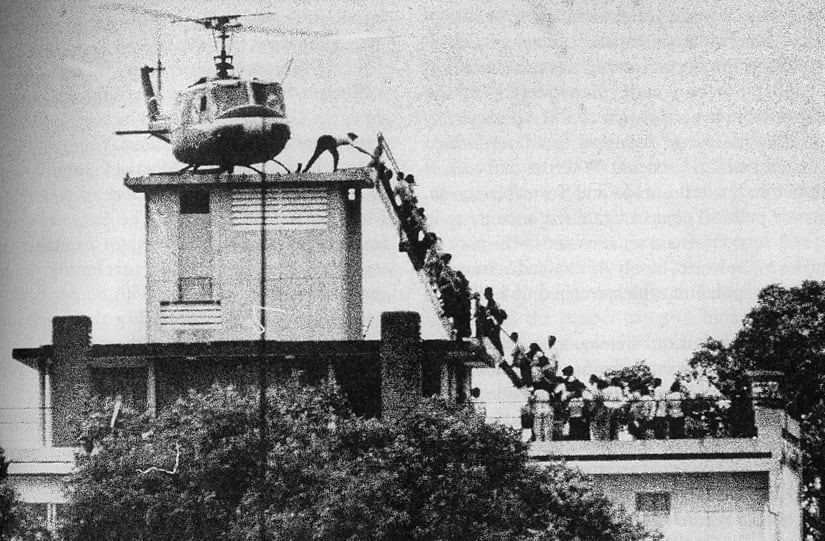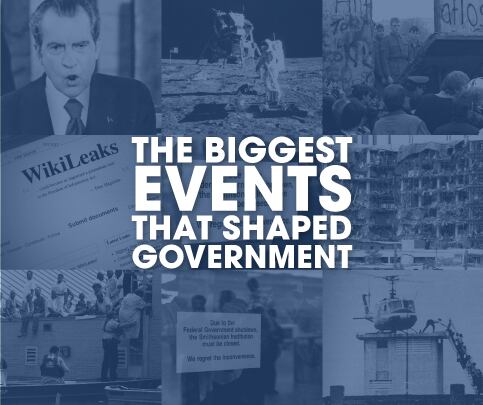It's the big reveal. To honor our own 50 year anniversary, we're unveiling our list of the 10 historic events of the last five decades that most shaped how government operates.
At first glance the list – which we published in chronological order, each with an article and film – looks like a lot of lists of important moments in U.S. history. We start with the Vietnam War and the moon landing, for example, and end with Hurricane Katrina and the Manning/Snowden leaks. Of course they're important.
But what makes these events significant to the general public, or even politics or federal law, is not necessarily what makes them significant to how government functions. Though those reasons might be a factor. For the sake of this list, these events matter not just because of what they represented in that particular moment in time, but for what came afterward – for what they inspired or enabled, what they set in motion. In many cases, most cases even, government is still experiencing the trickle down today.
Consider Vietnam. It traumatized America in a sense, filtering troubling images into living rooms, spurring nationwide protest and inspiring decades' long debates about what constitutes a justified war. All of that is important. But for government, it also redefined combat for the Pentagon, and forced the administration to provide the public with rationalization for military operations, after decades of owning the message.
RELATED

As for the moon landing, it was a much needed moment of patriotism for America during a troubling time. That's how most regard it. But it also cemented the U.S. government as supreme in science and technology, and served as vindication for all those in government that ever wanted to pursue a big idea. The success of that audacious goal, in the words of the Partnership for Public Service's Max Stier, set the groundwork for the success of many more audacious goals in the years since.
RELATED

So how did we come up with the list of 10? Certainly not by me or the editorial team at Federal Times, though we contributed to the conversation. Rather our advisory board – a team of individuals that tout first-hand experience and mastery of government management, workforce issues, procurement and IT – contributed to a far lengthier list, then whittled it down in one of the most fascinating round table discussions I've ever participated in. Our board members are listed below; many of them are also featured in the films – providing compelling perspective about why these events matter.
I encourage you to read the stories and watch the films. They'll likely strike an emotional chord for many, but they might also expand how you view the significance of these events to our collective history.
And through the first couple months of 2016, return to federaltimes.com/50 for much more content that will flow out to honor our 50th anniversary by showcasing 50 years of government. From interviews with and contributions by the top federal executives of today, to deep dives into the trends and people that transformed federal operations in the past and are destined to do so in decades to come, we have much more to share.
A big thank you to the Federal Times advisory board for their guidance:
- Dan Blair, President and CEO of the National Academy of Public Administration, former Deputy Director of the Office of Personnel Management
- Robert Carey, Vice President of Navy and Marine Corps Programs at Vencore, former Principal Deputy CIO at the Department of Defense
- Karen Evans, National Director of the US Cyber Challenge, Former Administrator of the Office of Electronic Government and IT, Office of Management and Budget
- Beth McGrath, Director of Federal Sector at Deloitte Consulting, Former Deputy Chief Management Officer at the Department of Defense
- Paul Posner, Director of the Graduate Public Administration Program at George Mason University, Former Government Accountability Office Director of Intergovernmental Programs
- Franklin Reeder, Founder of the Center for Internet Security, Former Director of the White House Office of Administration
- Stan Soloway, Professional Services Council CEO, Former Deputy Undersecretary of Defense
- Linda Springer, Former Office of Personnel Management Director
- Max Stier, President and CEO of Partnership for Public Service, Former Deputy General Counsel for Litigation at the Department of Housing and Urban Development
- Robert Tobias, Director of Business Development for American University’s Key Executive Leadership Programs, Former President of the National Treasury Employees Union
- Steve Watkins, Founder and President of Watkins Communications, Former Editor of Federal Times
- Dave Wennergren, Senior Vice President of the Professional Services Council, Former Assistant Deputy Chief Management Officer at the Department of Defense
More from our list of events:
- Watergate scandal: Public distrust of government begins
- Invention of World Wide Web: Digital revolution kicks off
- The End of the Cold War: Military reshaped, redefined
- Oklahoma City bombing: Barriers to government hardened
- Government shutdowns of 1990s: Partisan politics reaches dysfunctional heights
- 9/11 terrorist attacks: Information sharing fast-tracked
- Hurricane Katrina: Cross-government collaboration prioritized
- Manning/Snowden leaks: The threat from within emerges
Enjoy!
Jill Aitoro is editor of Defense News. She is also executive editor of Sightline Media's Business-to-Government group, including Defense News, C4ISRNET, Federal Times and Fifth Domain. She brings over 15 years’ experience in editing and reporting on defense and federal programs, policy, procurement, and technology.
In Other News




